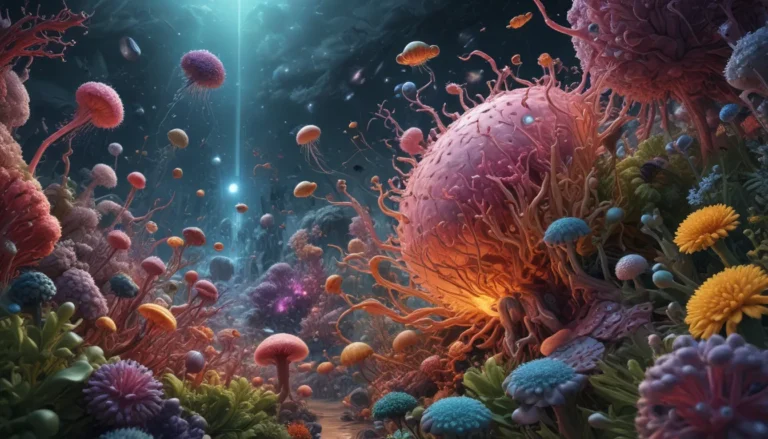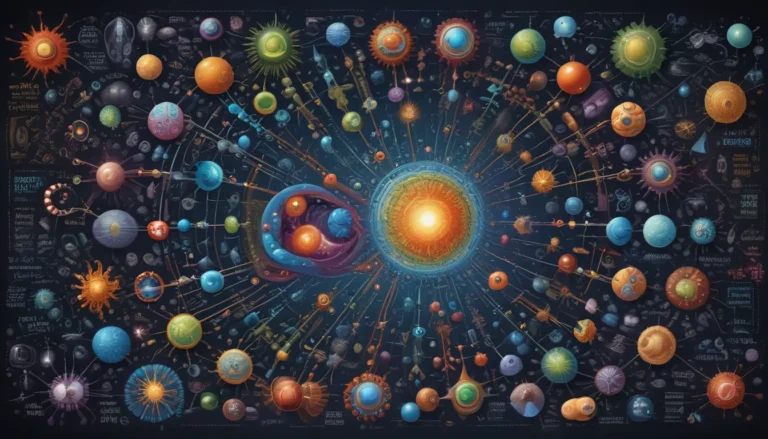A Note About Images: The images used in our articles are for illustration purposes only and may not exactly match the content. They are meant to engage readers, but the text should be relied upon for accurate information.
Welcome to the captivating world of neurobiology, where the intricate mechanisms of the human nervous system and brain come to life. As we delve into the fascinating field of neurobiology, we uncover astounding facts that shed light on the complexities of our thoughts, emotions, and actions. From the brain’s incredible plasticity to the astonishing speed of neural communication, neurobiology offers a glimpse into the remarkable capabilities of the human brain. Join us on this educational journey as we unravel the mysteries hidden beneath the surface of our minds.
Unveiling the Marvels of the Human Brain
The human brain stands as the most complex organ in the human body, housing over 86 billion neurons interconnected in intricate pathways responsible for our cognitive functions, emotions, and behaviors. Through the lens of neurobiology, we gain insights into how these neurons work together to create the myriad of human experiences we encounter each day.
The Intricate Communication System of Neurons
Neurons, the building blocks of our nervous system, communicate through a sophisticated interplay of electrical impulses and chemical signals. As these neuronal messages travel through the brain, they transmit vital information that shapes our thoughts, emotions, and actions.
- Neurons transmit information through electrical impulses along their axons.
- When the impulse reaches the end of the axon, it triggers the release of neurotransmitters.
- Neurotransmitters are chemical messengers that cross synapses, enabling communication between neurons.
Unlocking the Power of Neuroplasticity
Neuroplasticity, the brain’s remarkable ability to rewire itself in response to new experiences or learning, plays a crucial role in shaping our cognitive abilities and recovering from brain injuries. This adaptive feature highlights the brain’s capacity for growth and change, offering hope for individuals seeking to enhance their skills or overcome neurological challenges.
Fueling the Brain: Oxygen and Energy Consumption
Despite its compact size, the brain demands a significant amount of energy, consuming approximately 20% of the body’s oxygen and glucose. This metabolic requirement underscores the brain’s relentless activity as it powers our cognitive functions and sustains our daily activities.
The Intricate Dance of Synaptic Plasticity
Memories are etched into our minds through the process of synaptic plasticity, where the brain forges new connections between neurons. This fundamental mechanism underpins our capacity to learn, retain information, and navigate the complexities of memory formation.
Navigating Emotions: The Role of the Amygdala
Nestled within the brain, the amygdala emerges as a pivotal structure central to emotional processing. This almond-shaped region plays a vital role in shaping responses to fear, anxiety, and other intense emotional experiences, offering insights into the intricate interplay between our thoughts and feelings.
The Hippocampus: Master of Memory and Navigation
Situated in the temporal lobe, the hippocampus serves as a hub for spatial navigation and memory formation. Its intricate functions enable us to recall past experiences, forge new memories, and traverse the cognitive landscapes of our minds with ease.
The Influence of Neurotransmitters on Mood and Behavior
Neurotransmitters such as serotonin, dopamine, and norepinephrine exert profound impacts on our mood, motivation, and behaviors. These chemical messengers regulate key aspects of our emotional well-being, underscoring the intricate interplay between brain chemistry and mental health.
Illuminating the Path to Understanding Neurodegenerative Diseases
The study of neurobiology offers invaluable insights into neurodegenerative diseases like Alzheimer’s and Parkinson’s, unraveling the underlying mechanisms that drive these debilitating conditions. By delving into the intricate workings of the brain, neuroscientists pave the way for innovative treatments and interventions that hold promise for those affected by these disorders.
Bridging the Divide: Neurobiology and Artificial Intelligence
Advancements in neurobiology have ushered in a new era of artificial intelligence, where researchers seek to replicate the brain’s structure and function in intelligent machines. By drawing inspiration from the complexities of the human brain, scientists aim to develop cutting-edge technologies capable of performing intricate tasks with precision and efficiency.
Embracing the Wonders of Neurobiology
Neurobiology stands as a captivating field of study that unveils the mysteries of the human brain and nervous system. As we journey through the 10 astounding facts about neurobiology, we gain a deeper appreciation for the awe-inspiring intricacies of our neural machinery. From neurotransmitters shaping our emotions to the plasticity of the brain molding our experiences, neurobiology offers a profound glimpse into the essence of human cognition and behavior. Join us as we celebrate the marvels of neurobiology and embark on a voyage of discovery into the boundless potential of the human brain.
Frequently Asked Questions
-
What is neurobiology?
Neurobiology is the study of the structure, function, and development of the nervous system, encompassing disciplines such as neuroscience, molecular biology, physiology, and psychology. -
What are neurotransmitters?
Neurotransmitters are chemical messengers that transmit signals between neurons in the brain, regulating various physiological and cognitive processes like mood, memory, and movement. -
How does neuroplasticity work?
Neuroplasticity enables the brain to adapt and reorganize itself in response to experiences, learning, and injury, facilitating the formation of new connections and pathways. -
What are some common neurological disorders?
Common neurological disorders include Alzheimer’s disease, Parkinson’s disease, epilepsy, multiple sclerosis, and stroke, each affecting various aspects of brain function and requiring specialized treatment. -
How does genetics influence neurobiology?
Genetics play a significant role in neurobiology, influencing susceptibility to neurological disorders, brain development, and the functioning of neurotransmitters. -
What techniques are used in neurobiology research?
Neurobiology research employs techniques such as fMRI, electrophysiology, optogenetics, and genetic manipulation in animal models to explore the brain’s structure and function. -
What is the connection between neurobiology and psychology?
Neurobiology provides a biological basis for understanding behavior, emotion, and cognition, bridging the gap between the brain’s physical workings and psychological processes. -
How does stress affect the brain?
Chronic stress can lead to structural changes in the brain, impaired memory and learning, and an increased risk of mental health disorders, highlighting the importance of stress management strategies. -
What are recent advancements in neurobiology?
Recent advancements include deep brain stimulation for Parkinson’s disease, genetic discoveries in autism spectrum disorders, and brain-computer interfaces enabling direct brain-machine communication. -
How can neurobiology shape the future of medicine?
Neurobiology has the potential to drive advances in medicine by developing new treatments for neurological disorders, enhancing our understanding of brain aging, and unraveling the mysteries of consciousness and cognition, ultimately revolutionizing healthcare worldwide.
Embark on a journey of discovery into the wonders of neurobiology, where each fact uncovers a new layer of the brain’s intricate tapestry. Join us in celebrating the extraordinary capabilities of the human brain and embrace the boundless potential that neurobiology holds for transforming lives and shaping the future of healthcare. Explore, learn, and ignite your curiosity as we unravel the enigmatic realm of neurobiology together.






